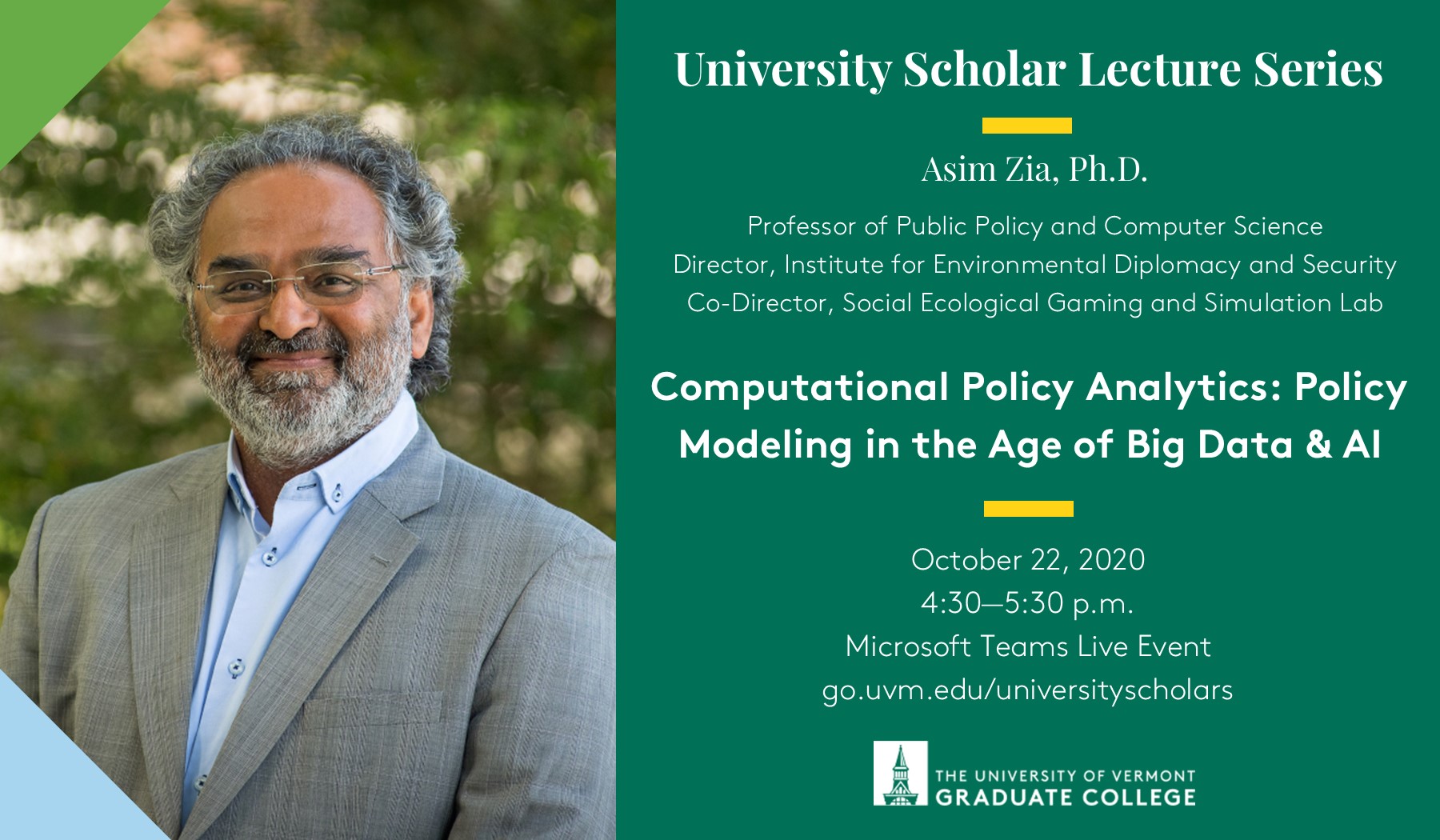The Graduate College is pleased to present the Teams Live Event Computational Policy Analytics: Policy Modeling in the Age of Big Data & AI, a lecture by University Scholar Asim Zia, Ph.D. on Thursday, October 22, 2020 at 4:30 pm.

With advances in computer sciences as well as widespread availability of big data from government programs, a new field of “computational policy analytics” is emerging that integrates computer science, especially Artificial Intelligence (AI) and machine learning, with public policy for generating novel insights to inform public policy design and evaluation processes. Three specific complexity science tools appear very promising for computational policy analytics. (1) Bayesian Belief Network Models and Machine Learning Approaches are suitable for modeling uncertainty that is inherent in policy systems. (2) System Dynamic Models can seamlessly capture the dynamic and complex feedback structures of policy processes. (3) Agent Based Models can simultaneously enable modelling of spatial and temporal dynamics, networks as well as explicit rule structures and decisions of agents, be they individual or institutional agents. These three approaches can also be combined, mixed and matched, in the so-called “integrated” models. These integrated policy assessment models are highly customizable and configurable as Decision Support Systems that can enable understanding of multi-layered, nested and inter-dependent policy systems. Utilizing these tools, this talk will present examples and insights from recent policy modeling applications funded by national agencies such as NSF, US-DOT, USDA, EPA, US-DoD and MacArthur Foundation. These policy modeling applications span land use policy, watershed management, infrastructure design, mitigation and adaptation to global climate change, energy policy, transportation and air quality policy and biosecurity management.
Asim Zia has made substantive scientific and policy contributions towards advancing the Sustainability and Resilience of Human Environmental Systems. He is an internationally known leader in developing computational models of Social Ecological Systems, Complex Adaptive Systems and Governance Networks. Foresight generated from these computational models is used widely to enable early warnings of systematic risks, design early actions and anticipatory policies, configure governance systems and implement adaptive management. He has published 58 journal articles, 19 book chapters and 3 books, totaling 80 peer-reviewed publications. His articles have appeared in journals such as Nature Climate Change, Environmental Research Letters, Global Environmental Change, Ecology and Society, Public Understanding of Science, Mitigation and Adaptation Strategies for Global Change, Journal of Artificial Societies and Social Simulation, PLOS One, Energy Policy, Journal of Environmental Psychology, Journal of Environmental Management, Conservation Biology and Sustainability.
He has served as a Principal Investigator, Co-Principal Investigator, or Senior Personnel on 22 research grants worth more than $60 Million. Grant funds have been secured from National Science Foundation, McArthur Foundation, US Department of Transportation, US Department of Defense and US Department of Agriculture. He has recently served a 3-year term on scientific review committee of the national socio-environmental synthesis center (SESYNC), acting as an academic editor for PLOS One since 2014, and serving a 3-year term as co-editor-in-chief of Complexity, Governance and Networks. He has a Ph.D. in Public Policy from the Georgia Institute of Technology; recipient of 2004-2005 best dissertation award from the Association for Public Policy Analysis and Management, a post-doctoral fellowship from the National Center for Atmospheric Research (2004-2006), a fellow at the Gund Institute for Environment and a senior research fellow for the Earth System Governance project. He was recently appointed as a Fulbright Global Scholar (July 2020-June 2022) to lead a project on “Securing Clean Water in Transboundary Indus, Jordan and Amazon Basins through Science and Environmental Diplomacy.”